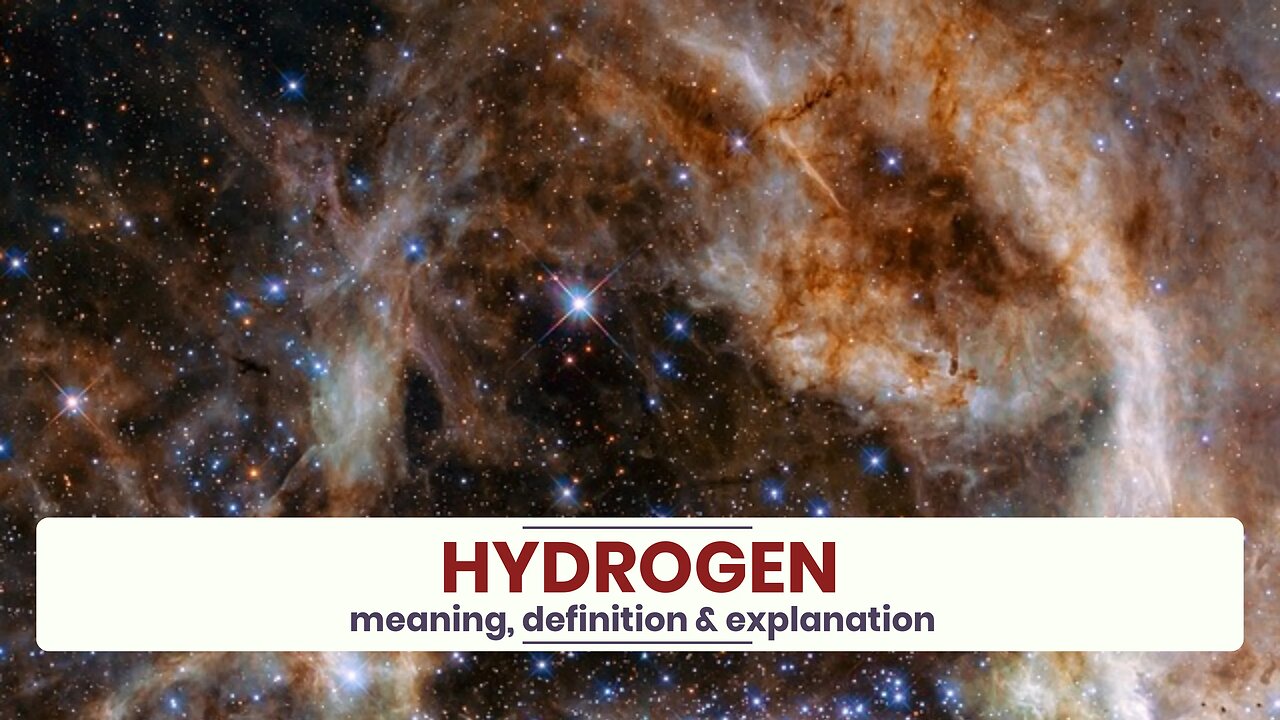Premium Only Content

What is HYDROGEN?
✪✪✪✪✪
http://www.theaudiopedia.com
✪✪✪✪✪
What does HYDROGEN mean? HYDROGEN meaning - HYDROGEN definition - HYDROGEN explanation. What is the meaning of HYDROGEN? What is the definition of HYDROGEN? What does HYDROGEN stand for? What is HYDROGEN meaning? What is HYDROGEN definition?
Hydrogen is a chemical element with chemical symbol H and atomic number 1. With an atomic weight of 1.00794 u, hydrogen is the lightest element on the periodic table. Its monatomic form (H) is the most abundant chemical substance in the Universe, constituting roughly 75% of all baryonic mass. Non-remnant stars are mainly composed of hydrogen in the plasma state. The most common isotope of hydrogen, termed protium (name rarely used, symbol 1H), has one proton and no neutrons.
The universal emergence of atomic hydrogen first occurred during the recombination epoch. At standard temperature and pressure, hydrogen is a colorless, odorless, tasteless, non-toxic, nonmetallic, highly combustible diatomic gas with the molecular formula H2. Since hydrogen readily forms covalent compounds with most non-metallic elements, most of the hydrogen on Earth exists in molecular forms such as water or organic compounds. Hydrogen plays a particularly important role in acid–base reactions because most acid-base reactions involve the exchange of protons between soluble molecules. In ionic compounds, hydrogen can take the form of a negative charge (i.e., anion) when it is known as a hydride, or as a positively charged (i.e., cation) species denoted by the symbol H+. The hydrogen cation is written as though composed of a bare proton, but in reality, hydrogen cations in ionic compounds are always more complex. As the only neutral atom for which the Schrödinger equation can be solved analytically, study of the energetics and bonding of the hydrogen atom has played a key role in the development of quantum mechanics.
Hydrogen gas was first artificially produced in the early 16th century by the reaction of acids on metals. In 1766–81, Henry Cavendish was the first to recognize that hydrogen gas was a discrete substance, and that it produces water when burned, the property for which it was later named: in Greek, hydrogen means "water-former".
Industrial production is mainly from steam reforming natural gas, and less often from more energy-intensive methods such as the electrolysis of water. Most hydrogen is used near the site of its production site, the two largest uses being fossil fuel processing (e.g., hydrocracking) and ammonia production, mostly for the fertilizer market. Hydrogen is a concern in metallurgy as it can embrittle many metals, complicating the design of pipelines and storage tanks.
-
 1:52
1:52
The Audiopedia
1 year agoWhat is EXECUTIVE DIRECTOR?
601 -
 24:37
24:37
Stephen Gardner
1 hour agoTrump JUST Exposed 2 HUGE LIES meant to TAKE HIM DOWN!!
7156 -
 1:09:52
1:09:52
vivafrei
1 hour agoCBS News "Debunks" The Blaze Pipe Bomber Story? Thomas Massie Threatened by Kash Patel? AND MORE!
4.1K5 -
 1:21:16
1:21:16
The White House
5 hours agoVice President JD Vance Celebrates Thanksgiving with Servicemembers and Delivers Remarks
1.33K10 -
 59:49
59:49
The Quartering
2 hours agoMTG MELTDOWN On X, Hasan Piker Runs From Ben Shapiro & AI Nightmare!
73K30 -
 1:16:24
1:16:24
DeVory Darkins
3 hours agoDISTURBING: Eric Swalwell left DUMBFOUNDED after he gets confronted about trans athletes
58.7K37 -
 LIVE
LIVE
Dr Disrespect
5 hours ago🔴LIVE - DR DISRESPECT - ARC RAIDERS - RANDOM SQUADS
1,974 watching -
 2:06:36
2:06:36
Side Scrollers Podcast
5 hours agoThis is the Dumbest Story We’ve Ever Covered… | Side Scrollers
21.9K6 -
 1:13:26
1:13:26
Steven Crowder
7 hours ago🔴 Jay Dyer on Hollywood, The Occult, and the Attack on the American Soul
230K173 -
 1:26:28
1:26:28
Sean Unpaved
4 hours agoNFL Thanksgiving Games Are Going To Be ELECTRIC! | UNPAVED
20.4K3